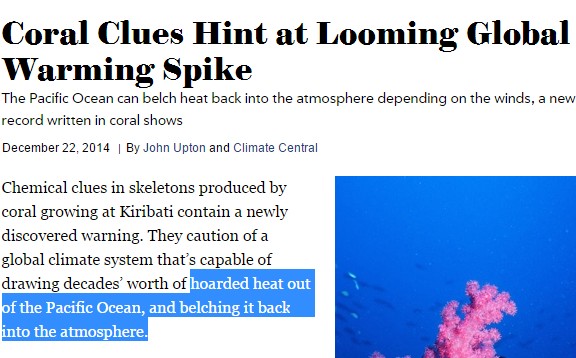Coral Clues Hint at Looming Global Warming Spike – Scientific American
The deep oceans are much colder than the atmosphere. Heat always flows from warmer objects to colder ones. The oceans can’t “belch heat into the atmosphere” If cold water from the deep oceans came to the surface, the atmosphere would cool – like a La Nina event.



Sounds like more junk science.
The oceans are the great heat sink of our planet. They will always serve to moderate the temperature of the atmosphere. The other significant heat sink is the biosphere. No doubt we have affected the latter with our extensive logging, agriculture and harvesting of fishes. But those activities are unlikely to change anytime soon.
Speaking of the oceans, check this out:
http://www.cfact.org/2014/12/22/what-if-obamas-climate-change-policies-are-based-on-phraud/
Feely and Sabine is junk science to a new level. Don’t dare question their work, though.
Policy-driven evidence making – it’s what models do best.
So transparent it hurts.
Policy-driven research will soon show that corals actually belch hot methane directly to the atmosphere. The models are already in place and printing results..
The second worse thing is that Scientific American, a one time jewel of information for intelligent laymen, has become such an ignorant rag — but even worse, there are many people who will read Scientific American these days and imagine that they are being educated.
When I think of how Scientific American has gone downhill, I am reminded of those “before and after” photo series of crack addicts.
What? No, I didn’t take the rent money. No, I didn’t buy crack! No, just borrowed. I bought a whole year of Scientific American, honey! What? The package got lost and they are sending a new one …
“Belch heat back into the atmosphere”? What??? SciAm is run by a bunch of liberal, progressive fifth graders. Sheesh!
Purple prose. What a great specimen. Just in the first two paragraphs:
Purple prose: What it is and how to avoid it.
Simple. Stop reading cheap rags.
Wasn’t that a Zane Grey novel: “Writers of the Purple Prose?”
🙂
“When winds weaken, which they inevitably will, warming will once again accelerate,” Thompson said. “The warming caused by greenhouse gases and the warming associated with this natural cycle will compound one another.”
Yea, though you doubt, fear not! It will come again, you will be forsaken, your crops will wilt, the land that was once lush will wither and die. So sayeth the holy Models, so it shall pass.
Problem with wind relieved by burping.
People from frozen north want to stay on idyllic coral island for longer but need more “funding”..
Mean ole sea hoarding our heat.
This is anthropomorphic science as once portrayed by Disney. Bring on the playful dolphins.
I can see the shot in my mind. The camera drops below the waves and drifts into a close up of a bunch of coral polyps (surrounded by mottled dead, white coral.) All at once they all grow mouths and burp a mass of bubbles and then painfully grin into the camera and say “excuse me” sadly, and in unison. I expect to see the scene in AlGore™’s next movie.
“The deep oceans are much colder than the atmosphere”
Rats, yet another research project, but it is clear even before beginning that the truth of that statement is going to depend on latitude because the deep ocean cares little latitude.
Of course you are right that this is a moron’s assertion in context, but those who actually care about science will want to know the truth or falsity of that assertion, regardless. It is an interesting question.
No problem, just dump 4 Hiroshimas worth of Gas-X into the oceans per second, and call me in the morning.
We now know where all the journalists from The Weekly World News went when it folded.
http://www.alexxcast.com/wp-content/uploads/2014/08/bat-boy-WWN.jpeg
Since coral reefs — like those in Cozumel — are said to have been in existence for >10,000 years, then they can obviously survive both hotter and colder temperatures than those over the last 100 years. For the cause of the destruction of Caribbean reefs, look no farther than the lionfish (except in Cozumel, where everybody — both divers and locals – hunt them.)
As others have noted, observe the use of the word “belch.” That is a word I most often see on headlines and picture captions of smokestacks or cooling towers with lots of steam angled to look as dark as possible. Those plants are “belching” carbon (also known as CO2), with the predominant greenhouse gas, water (also known as H2O) being ignored.
And on a more personal note, Tony, MFC & HFNY (Merry Fine Christmas and Happy Fun New Year!)
Once again this site has it All Wrong.
Heat is sneaky. It’s emotional. And it’s a little spiteful. It’s purposely hidden in the deep oceans; and just when we’re most apathetic about global warming, it’s going to come welling up and yell “Boo!” and burn everything up.
–AGW chapter 17 verse 32
Thus sayeth the lords of warming.
And here I thought fire elementals were a thing of the past…
I guess that Surtr or the ifrits are now living at the bottom of the oceans.
The Lord of warming
http://i45.tinypic.com/t64it5.jpg
Oceans belching into the atmosphere; oh my!
https://www.youtube.com/watch?v=5J-LvMxKvFY#t=33
Reblogged this on Centinel2012 and commented:
Ahh but hot to cold is old school science not the new PC science, what could all those old white guys possibly know any way!